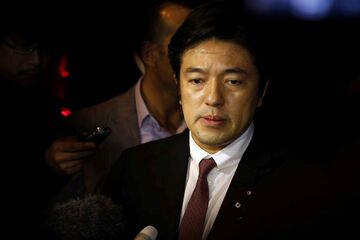Golez: A drastic reaction of China to Trump's engagement with Taiwan might have repercussions in the East China Sea forcing Japan to move towards Taiwan. I quote from the this Bloomberg article:
"While it is unclear what line the U.S. will take on China after Trump’s inauguration in January, Japan will pay close attention and is likely to align its policy with its only treaty ally (the U.S.), Nakayama said. That could include researching the possibility of military cooperation with Taiwan, with whom Japan has no formal diplomatic ties, he added."
Japan Watches Uneasily as Trump Shakes Taiwan-China Ties
by- China could seek to hit back via Japan, former official says
- Japan spars with China over military plane encounters
Magnus: It's Not Obvious What Trump Wants on China
U.S. President-elect Donald Trump’s apparent willingness to engage with Taiwan could spur Chinese retaliation that draws in Japan, complicating the geopolitical landscape in North Asia, according to a former Japanese vice minister for foreign affairs.
Yasuhide Nakayama, now deputy chairman of a ruling Liberal Democratic Party panel on security and prevention of terrorism, said he saw Trump’s recent phone call with Taiwan’s president Tsai Ing-wen as a "smart" move because it took place before his inauguration and limits China’s scope to react.

Yasuhide Nakayama
Photographer: AFP/Getty Images
"Normally you would expect a call with Taiwan to be kept secret, but the transition team actively publicized it," Nakayama said in an interview last week at his offices in Tokyo. "I take that as a good sign, that they are sending a signal that they are giving greater weight to free China, as opposed to Communist China.”
Still, Trump has since lashed out at China again, accusing it of failing to play by market rules. On Sunday he told Fox News: "I don’t know why we have to be bound by a One-China policy."
Any shift toward Taiwan could have consequences for Japan, Nakayama said. "Depending on how this pans out, things could change a lot for Japan, because we have a shared destiny with Taiwan.”
The call with Trump was the closest a Taiwanese president has come to getting formal American recognition since the U.S. established relations with the Communist government in Beijing almost four decades ago. With it, Tsai drew global attention to the democratically run nation’s increased isolation in the shadow of a rising China, which considers Taiwan a renegade province.
While China has largely taken a measured response to the U.S., focusing its ire on Tsai, any escalation of frictions across the Taiwan Strait could have a ripple effect on countries like Japan in what is an already-tense region. The U.S., China and Japan are the world’s three biggest economies while China has in the past used trade restrictions and curbs on tourism to punish Taiwan for perceived slights.
Japan’s own ties with China, its biggest trading partner, have failed to recover fully from their worst crisis in decades after the Japanese government bought disputed islands from a private landlord in 2012.
Coastguard ships from the two countries tail one another around the islands close to Taiwan, known as Senkaku in Japan and Diaoyu in China. Japanese fighter planes frequently scramble to head off Chinese military aircraft in the area -- the extra cost of the rise of such flights will be included in a third extra budget planned for the fiscal year ending March.
Possible Retaliation
China’s defense ministry said two Japanese F-15 fighters disturbed a regular training mission of its air force over the Miyako Strait, near Taiwan, on Saturday morning. The Japanese fighters’ actions were “dangerous, unprofessional and violate the freedom” of navigation and flight under international law, the ministry said in a statement.
Japan’s Defense Ministry denied the accusations Monday, saying in a statement on its website that its planes had acted lawfully and not interfered with the Chinese aircraft. "It is extremely regrettable that the Chinese Defense Ministry issued an obviously false statement, which damages attempts to improve bilateral ties," the statement said.
Four of the more than 10 Chinese military aircraft that flew over the Miyako Strait also passed outside Taiwan’s southern air defense identification zone, Taiwan’s defense ministry said in a statement. It was the second time in less than a month that Chinese military aircraft circled near Taiwan, the Taipei-based Central News Agency reported.
Any worsening of tensions around the disputed islands would be a serious economic risk for Japan.
While it is unclear what line the U.S. will take on China after Trump’s inauguration in January, Japan will pay close attention and is likely to align its policy with its only treaty ally (the U.S.), Nakayama said. That could include researching the possibility of military cooperation with Taiwan, with whom Japan has no formal diplomatic ties, he added.
No comments:
Post a Comment